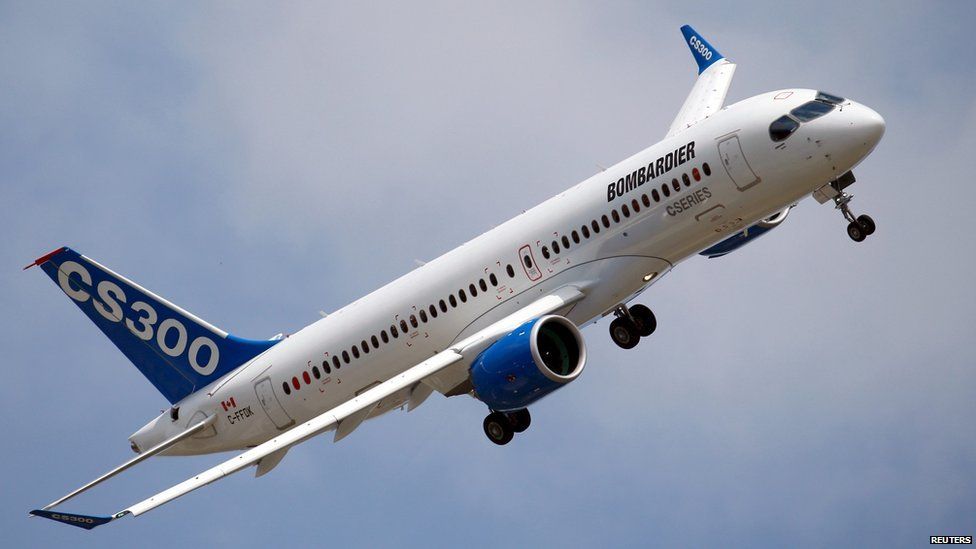Further tariff of 80% imposed on import of C-Series plane
- Published

The US Department of Commerce has again ruled against aerospace firm Bombardier in its dispute with rival Boeing.
A further tariff of 80% has been imposed on the import of Bombardier's C-Series jet to the US for alleged below-cost selling.
This is on top of an earlier tariff of 220% which related to subsidies Bombardier got from Canada and the UK.
There have been warnings that the import tariffs could threaten Bombardier jobs in Belfast.
About 1,000 jobs are linked to the C-Series, the wings of which are made at a purpose-built £520m factory in the city.
A spokesperson for Bombardier said: "We strongly disagree with the commerce department's preliminary decision."
The firm said the ruling represented an "egregious overreach and misapplication of U.S. trade laws".
"The commerce department's approach throughout this investigation has completely ignored aerospace industry realities," it said.
"This hypocrisy is appalling, and it should be deeply troubling to any importer of large, complex, and highly engineered products."
Union concern
The programme is not just important to Bombardier jobs in Belfast, but also to 15 smaller aerospace firms in Northern Ireland - and dozens more across the UK - which make components for the wings.
The US Department of Commerce rulings, which could more than triple the cost of a C-Series aircraft sold into the US, could jeopardise a major order placed last year from US airline Delta.
A final ruling in the case is due early next year.
Davy Thompson from the Unite union said workers are very concerned.
"It looms very large over these workers and it's time for the British government to actually step up for British workers," he said.
"We see the British government being bullied by Boeing.
"The EU needs to step in, because effectively they are being bullied too. It needs to stop and it needs to stop now."
The history of Bombardier in Northern Ireland
A government spokesperson described the latest development as "disappointing", but said it was "hardly surprising given last week's preliminary ruling sided with Boeing".
"As with the investigation into subsidies, this is only the first step in the process," they added.
"Since the interim finding, we have had further Cabinet level engagement with the US Administration and Canadian government.
"We continue to make all efforts alongside the Canadian government to get Boeing to the table to resolve the case."
'Avoidable outcome'
In a statement Boeing said: "Today's decision follows a fact-based investigation by the Commerce Department and it validates Boeing's dumping complaints regarding Bombardier's pricing in the United States.
"This was an avoidable outcome within Bombardier's control. The laws governing global trade are transparent and well known."
US Secretary of Commerce Wilbur Ross said: "The United States is committed to free, fair and reciprocal trade with Canada, but this is not our idea of a properly functioning trading relationship".
"We will continue to verify the accuracy of this decision, while doing everything in our power to stand up for American companies and their workers."
The Canadian aerospace firm employs more than 4,000 workers across four sites in Northern Ireland.
Components of the C-Series jet are manufactured at a purpose-built factory in east Belfast and many other local firms are involved in the supply chain.
The punitive tax would significantly raise the price of the jet in the US market, and threaten the future of the product.
Boeing took the case after accusing Bombardier of anti-competitive practices.
It claimed its rival was selling the C-Series jets below cost price after taking state subsidies from the Canadian and British governments.
When the preliminary tax ruling was made last week, Wilbur Ross said: "The subsidisation of goods by foreign governments is something that the Trump administration takes very seriously."
The US trade commission is due to rule on the Department of Commerce's 220% tax proposal next year, but the Irish Small and Medium Enterprise (ISME) Association said the EU should not wait for the final decision.
Its chief executive, Neil McDonnell, said the EU "should signal right now that it will unconditionally, unequivocally and aggressively oppose protectionist measures by the US with tariffs of like effect".
- Published12 September 2017
- Published27 September 2017